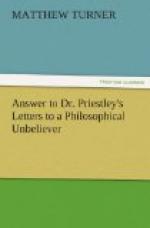conclude he mist of his design, that is, he wanted
power or knowledge, than that he wanted benevolence.
If he means to argue that it is more rational to conclude
this Deity wanted power and knowledge than that he
wanted benevolence, and because Dr. Priestley fancies
himself to have proved the Deity cannot want the two
former, he concludes the Deity cannot want the latter,
as the less probable for him to be deficient in, his
argument is no more a truism. As a wish, that
the Deity may not want benevolence, in that sense
let him take it as agreed upon. He allows that
misery in the human species proves malevolence in the
Deity, and happiness the contrary. All the proof
adduced in favour of benevolence is in asserting that
throughout the universe, good is more predominant
than evil. The infinite extent of benevolence
he will allow incapable of proof; but then it is said
that the evils which mankind endure are not so great
as might be inflicted upon them; that virtue to vice,
happiness to misery, health to sickness bear at least
equal proportions. That lesser evils exist instead
of greater is indeed but a poor proof in the favour
of the benevolence of an all-powerful Being. Or
grant, that good is more predominant than evil, this
surely is no proof neither of the benevolence of a
kind and all-powerful Being. Yet Dr. Priestley
adds that the general benevolence of the Deity is
unquestionable. How unquestionable? It is
questioned by the author himself, and he declares
he cannot prove it. After this he asks, who will
pretend to dictate to such a Being? He might in
the same stile conclude that no objection deserved
a reply. The whole of this is absurd; but when
the Doctor begins to feel enthusiasm he is like the
rest of the ecclesiastical arguers. They reason
themselves into imaginary Beings with more imaginary
properties and then fall down and worship them.
God is said to have made man in the image of himself.
If he has done so, man is up with him, for he in return
makes God in his own image. Much as the imagination
of one man differs from another, so differs the God
of each devotee. They are all idolaters or anthropomorphites
to a man; there is none but an atheist that is not
the one or the other.
The admission of evil into the world is an argument
so exceedingly conclusive against at least a good
Deity, that it is curious to see how Dr. Priestley
studies to get rid of that difficulty. He partly
denies the fact, at least he says there is more good
than evil in the world. At last he even turns
evil into good, or what ought to be the effects of
one, into what ought to be the effects of the other,
as he says pain is necessary for happiness. But
if pain is, as he says, in this world necessary for
happiness, why will it not still be necessary hereafter?
He answers, because by that time we shall have experienced
pain enough for a future supply of happiness.
If it is objected, why have we not had pain enough
by the time each of us are twenty or thirty years of




